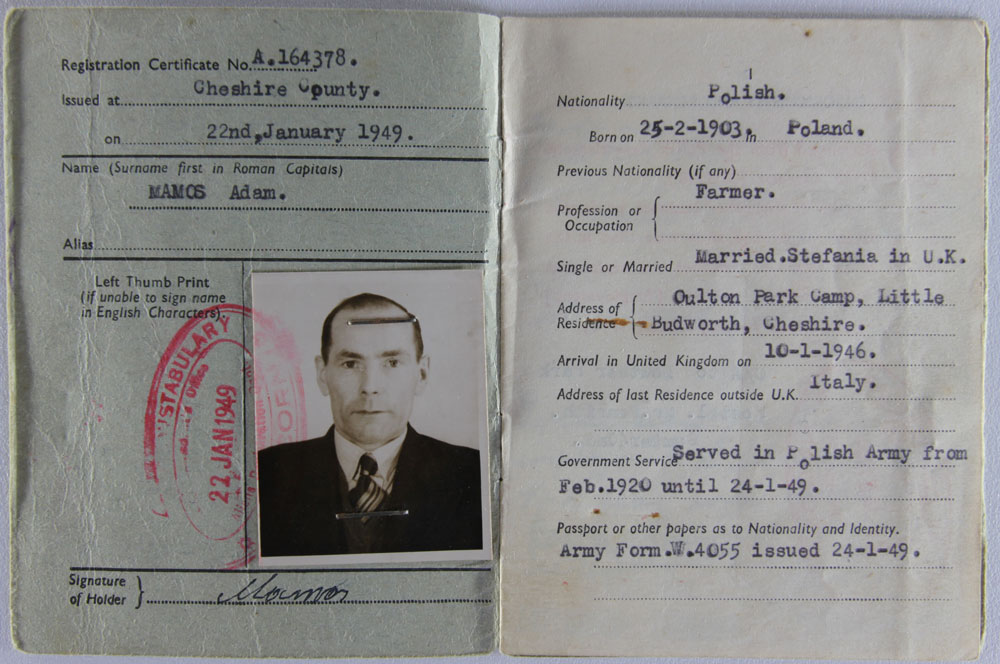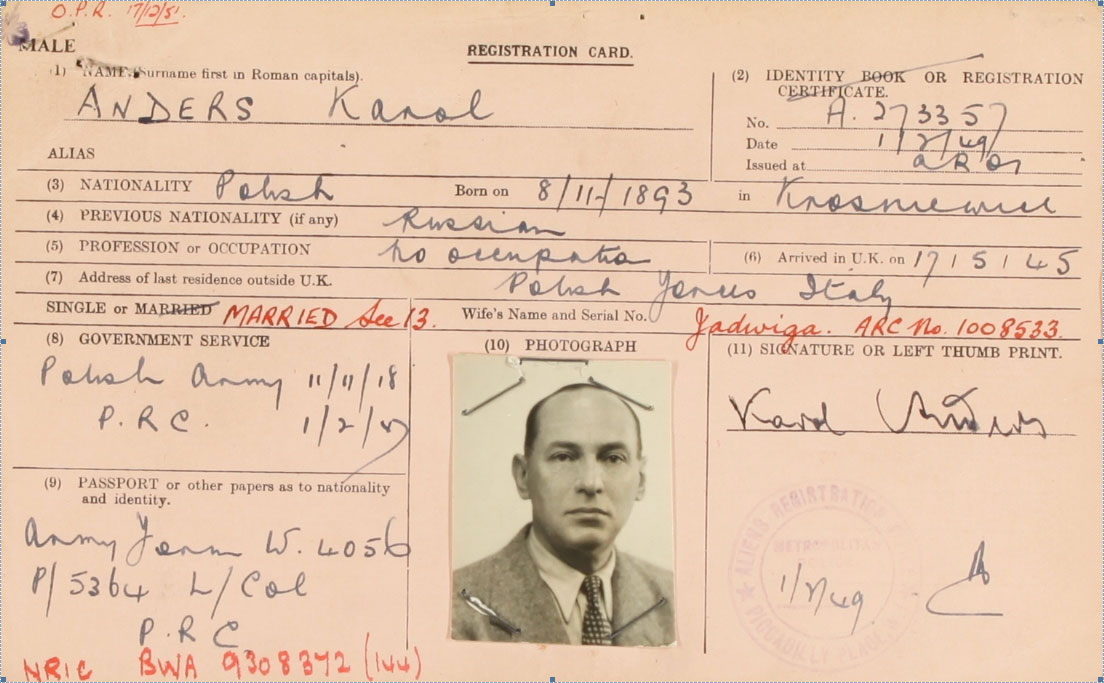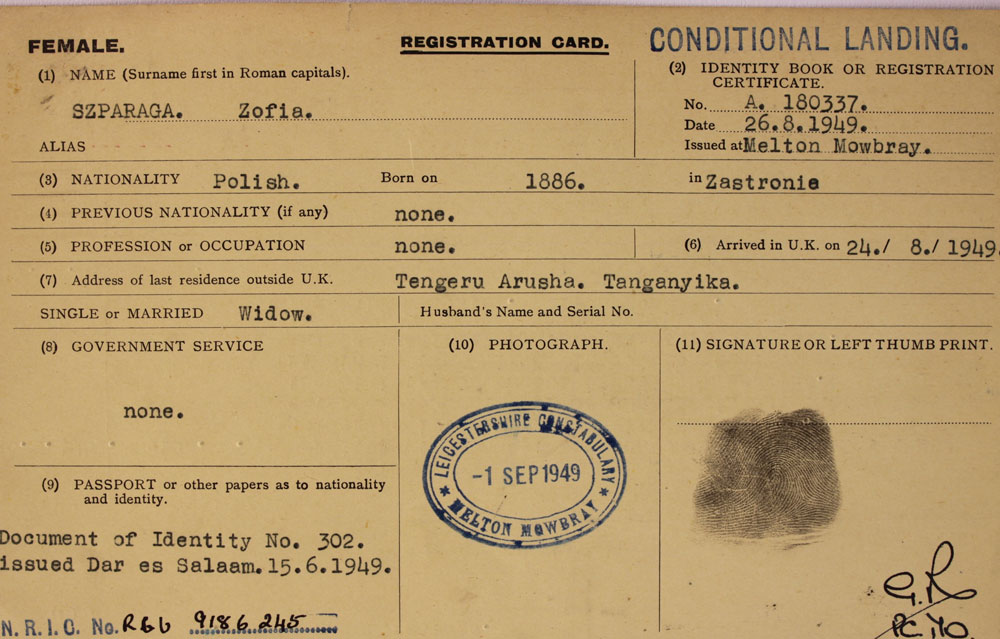As an ‘Opening up Archives’ trainee I was set the task of preparing a community engagement project. Being a Polish national with a Master’s degree in History, I decided to research the post-war Polish community in Leicestershire. As it turned out, the Record Office for Leicestershire, Leicester and Rutland did not hold many records regarding this community, however, all of my colleagues mentioned that there were something called ‘aliens’ cards’ in our strongroom. So I started my project by going through this collection, which had been donated by the local police force in the year 2000, and which consisted of 93 boxes. This deposit has not only become my main source of information for the project’s statistics, but it also provides essential knowledge about Poles living in the county.

Adam Mamos' Alien certificate
Polish soldiers who fought under the British Command in the Second World War, as well as their families who came to Britain in the 1940s, were obliged to register with the police under the Aliens Registration Act 1914. They had to inform the police of any changes to their: name, address, employment, marital status etc. Each ‘alien’ had their own alien certificate and were required to provide it any time should a police officer demand it. For those who lost or damaged their ‘proof of identity’ and those who neglected to notify the constabulary about changes in their personal circumstances, there were penalties ranging from fines to imprisonment. The aliens’ cards and certificates included, or should have included, information on the alien’s name, date of birth, place of origin, occupation, army service, date of arrival to the UK, employment history, criminal offences and addresses. Until 1960, when many Poles were exempt from regularly registering with the police, they had to maintain this close – and as I am told – sometimes very harsh relationship with the local authorities.
Based on the aliens’ registration cards, I have built an excel database of the Polish people who resided in or even just briefly passed through Leicestershire in the 1940s, 1950s and 1960s. Most of those who decided to settle in the county stayed in Melton Mowbray, Market Harborough, Loughborough and Leicester and worked in several famous companies such as: Pedigree Petfoods, John Rubber Bull, Wolsey, British Shoe, Corah Textiles and many others. I have recorded nearly 4,500 aliens in my database and one of them is my great uncle, who came to Leicester and worked for the British Shoe Corporation. Finding his registration card pleased me greatly as it gave me a personal connection to the project.
Another interesting aspect of the aliens’ cards is the Immigration Officers’ reports, which are sadly not available for all of the records. These reports consist of additional information that includes details of the Poles’ lives before the war, facts about their journey to Britain as well as their family connections to the other aliens. It is worth mentioning that many of these reports are summed up in an appalling and arrogant way, such as ‘Unintelligent type’ or ‘Typical peasant woman not interested in anything apart from household duties’, which is interesting in itself.
Many of the records I came to work with did not hold any information apart from the date of birth, name and marital status. Also I have discovered that many of the cards are missing from our collection. I became aware of this because of sporadic notes written on certain aliens’ cards which mentioned the destruction of their deceased partner’s records. All of this makes me wonder how incomplete my database is and how much information is missing.
For all of those who have foreign ancestors, I would recommend checking the archives or record offices for their relatives’ aliens’ cards as it could be a brilliant source of information. In my case, I am grateful that at least some of the records, including photographs and signatures, survived and are in perfect condition. I also have to admit that I am thankful that I live in a 21st century Britain where reporting to the police is not necessary every time I wish to change my place of work or go away for a few weeks; I simply can’t imagine doing that!
See The National Archives’ guide to aliens’ registration cards 1918-1957 for help and advice on searching these records.


This is a really interesting article – great work with your project. Sounds like a horrible way to have to live, and something that I’d never heard of before reading this.
I think I remember scanning the ID card with ‘Typical peasant woman not interested in anything apart from household duties’ (or something similar and equally appalling)! Almost impressive how they managed to be classist, racist, and misogynist all at once! Fascinating subject though, and great snapshots of a bygone, but still resonant, period of history.
Thank you for your comments guys. I have never heard about the Aliens cards until I started working at ROLLR and believe me the whole system is still a very alien idea to me 🙂
Kasia this looks like you have delved into lots of very interesting records. It is very interesting reading, and will be fantastic reference for all the young Polish people settling here in the U.K.
I don’t like the fact the Polish people from the past living here were called Aliens, especially as they were serving with our forces in the war.
Couldn’t agree more when it comes to the name Melody! 🙂
The most interesting and full of facts are the mentioned Immigration Officers’ reports but sadly most of the recods lack them. Anyway, it should be popularised more as each record office should have those cards and many descendants would be able to find interesting details about their ancestors.
Very interesting, it would be nice to think that all the cards in the UK could be be in a big database. As you probably know there were a lot of Polish people in Devon due to the Polish Resettlement Centre in Newton Abbot. The Alien cards also link into the HO 405 (British Nationality records) at The National Archives which are not as well listed as the cards or MEPO 35. Interestingly Karol Anders didn’t seem to have been Naturalised.
The point about the way the Poles were treated during after the Second World War is not unreasonable as they were Aliens and therer was a need to ensure that the UK was safe and they couldn’t have people wandering around the country, even British people were banned from the coast. For example, Vera Atkins of the Special Operations Executive (SOE)was restricted to which areas she could go until 1943 because she was Romanian and used her mother’s name rather than her real name of Rosenberg (see the SOE file on her at TNA).
It is true that some sort of regulation was needed to know ‘who, where and when’ and yet going through those cards I believe that in some cases British authorities went over the top with the legislation. Especially comparing with the modern days when you hear on the news that 50,000 students overstayed and nobody knows where to find them – then I do wonder how can there be such two extrems?! Not to mention registering as aliens British women who married a foreigner 🙂
Can I ask how do you know that Karol Anders wasn’t naturalised?
I don’t disagree about the war-time legislation which stayed for some time after the war and such measures were either repealed or extended, Exchange Control being an obvious example lasting until 1997 when it finally disappeared for most of its provisions. Section 18B and 18D of the Defence Regulations were used extensively to detain people as were attempts to stop newspapers printing the truth about the war, Michael Foot made a well-known speech when he was young about this and he thought the Government might want to close them. The point about British women marrying an Alien comes from the First World War and could be an issue when their husbands died or divorced them. During the Second World War there were few opportunities for people to visit the UK as the country was effectively closed.
The reason I say there was no British Naturalisation for Karol Anders is that there is no naturalisation record of him at The National Archives, Kew, either for his own naturalisation file nor for a certificate. Whilst not all the files survived most of the certificates do survive. I couldn’t see anything for him on a search of the London Gazette where he would have had his naturalisation announced. Do you think he was naturalised?.
To be honest I don’t know if Anders was naturalised as he got exempt from registering with the police in 1960 and most Poles became naturalised in 1970’s. My issues is that not all of the cards do give information about naturalisation e.g. my great uncle which I mentioned in the text has hardly anything on his Alien card even though he came to Leicester in 1947 and lived here until his death in 2001. Card doesn’t show that he got divorced and then remarried, that he was exempt and eventually naturalised in 1974. Which obviously makes me wonder how much more information the surviving records lack of. The beauty of working with any records, I suppose, is that there is only a certain picture and if you want or need it to be more complete you need to dig in lots of other records e.g. companies’, hospitals’ etc. Have to also remember about data protection which doesn’t make the work easier. Unfortunately I am pressed for time and Aliens cards are just a small part of my project. Maybe one day someone else will be able to follow what I have started.
PS. According to the Ancestry.com Anders died in 1971 which might explain why he wasn’t naturalised.
Fascinating post – really important to document and remember policies such as the Aliens Registration Act as I am sure there will be times in the future when something very similar is proposed again.
Thank you for your comment – I also think it is a fascinating subject and there should be more emphasis placed on it; not just regarding Polish people but all of the ‘Aliens’ and the system itself.
Great article! You must really enjoy working down South having been surrounded by such a minefield of interesting primary sources! I am sure the Alien registration cards will be very useful to those studying the history of post-war migration and complement other more general sources of information like the Census which does not adequately address the complexities of migrant experiences. It is a pity that they cover just the London area. Is there anything for Yorkshire and would it be possible to obtain permission to look at the records for the period after 1957? Thanks.
Hello Frank and thank you for your comment. As far as I know each record office/county archive should have the Alien certificates for the immigrants who lived in the area e.g. certificates in this Record Office cover people who came to Leicester & Leicestershire. If you’d like to research records after 1957 you will have to go down to the Yorkshire archives and ask about the procedure – bearing in mind the restrictions the Data Protection Act impose on the organisations such as record offices. Hope you enjoy your research and good luck with it!
Kasia,
as you may be aware the Data Protection Act only applies to people who are alive and born less than 100 years ago including third parties. Hopefully that is what the archive offices are working to.
David
That is true David but – as you pointed out – technically a member of the public can’t see an Alien Certificate of a person born after 1912 (unless that person has passed away). And most of the certificates we do hold in ROLLR are of people born after that time, so it would be tricky to research for someone like Frank who would like to go through the records past 1957.
Out of over 4500 Poles who settled in Leicestershire, maybe only 25% of them were born before 1912 and their details will be available to the public via our website. The rest is only statistical base for my project and unless death certificate is provided for the family member, we do not tend to show them.
Hello Kasia,
Congratulations! It’s a very big task! I am from Argentina, and in January was at Kew because my PhD is about the Polish who had came here from the Uk in the postwar. I know that some of them were in Melton Mowbray. 🙂
And there is a man who foght with the Anders and died in Melton who was living in Buenos Aires when he decided to go the Polish Army.
By the way, did you find any detail about related with Argentina?
Thanks a lot!
Claudia
Hi Claudia – I had been given your card by Melton’s library woman who is married to a Pole 🙂
I have nearly finished going through the Aliens Cards and soon to make a use out of the database. Unfortunatelly I haven’t found any connection to Argentine apart from the fact that some reports mention people leaving Britain for that country.
How is your work going then?
Hi Kasia,
I was on holiday, but now I am restarting the research. It’s so interesting. The lady in Melton and her Polish husbad are GREAT. They did a lot for me, I could find the Polish DPs camp only with their help.
Now I am working with Florian Czarnyszewicz papers. He was an important writer for the Kresy region but he spent all his Argentinian life as a worker in the meat packing industry in a migrant town at 60 km from Buenos Aires.
Your work is really interesting I wish were in Leicester!
Congratulations.
Whilst researching my surname I came upon your article and imagine how thrilled I was to see the first registration card come up with my Unce Adam’s details. My father was his brother Michael. It would be amazing if you had any information of his. I found this a fascinating read and a reconnection with my family’s past. Thank you.
Hello Lorna!
I have actually interviewed Julian Mamos – Adam’s son – if you like to I shall get in touch with him and ask to contact you – would that be ok?
I have just checked and we do have Michal Mamos’ alien card – you can order it by email and it can be scanned and send to you (for further details please go to the Record Office for Leicestershire, Leicester & Rutland website) 🙂
Thank you for your responses Kasia. I am actually in touch with my cousin Julian Mamos, and the rest of his family, we have always kept contact. I will certainly try to obtain my fathers alien card as it would be nice to have to keep. Do you know the e-mail address that I need to request it through please? I apologise for the delay in getting back to you but ill health had prevented it. Thank you once again.
Hello Kasia
I am very impressed with the work you have done regarding ‘Aliens’.
My father was in the Polish 2nd Corps fighting on the front line at Monte Casino and came to the UK in 1946. My mother arrived earlier in 1944 having been recruited into the Polish airforce while living in Kondoa, Africa. They settled in Leicester.
I am currently writing a fictionalised novel based on their true story, which I have been researching for ages, but it was only when my wonderful friend, Tina, came across your website, that she alerted me to its existence.
I remember accompanying my mother to the Police Station in Charles Street, Leicester when she found a job, (In the 1950’s I think) and they were so nasty to her that she came a way sobbing.
Would it be possible to trace their Alien Cards so that I might incorporate them in my book.
Their names are Zygmunt Powiecki and Maria Powiecka.
I should be so happy if you could help me. With best wishes, Krystyna.
Hi Krystyna,
Unfortunately we’re unable to help with family history requests on the blog, but if you go to our contact us page: http://nationalarchives.gov.uk/contact/ you’ll see how to get in touch with our record experts via phone, email or live chat.
I hope that helps.
Nell
Hi Kasia
Great job:)